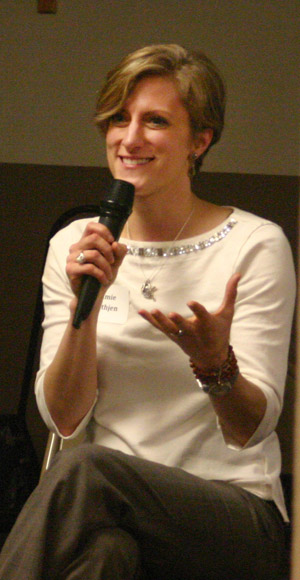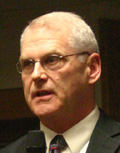By Celine Klosterman

IOWA CITY – Natural methods of fertility care respect a woman’s body and follow God’s plan for sexuality, four health professionals told nearly 100 people at St. Wenceslaus Church March 29.
Two Iowa women who received grants to complete training to offer the Creighton Model FertilityCare system, a natural approach to family planning and women’s health, spoke during a Culture of Life Dinner. The St. Wenceslaus Knights of Columbus, along with Dr. Stephen Pallone and his wife, Melinda, offer the tuition grants. Pallone, a former St. Wenceslaus parishioner, was among two doctors who also spoke during the dinner, the second such gathering since 2012.
Grant recipient Jamie Rathjen shared how she came to open the Fiat FertilityCare Center of the Cedar Valley in Cedar Falls. The journey began a few years ago, when she was enrolled in a graduate program in community health education at the University of Northern Iowa. There she got “fired up” by what she studied on women’s fertility awareness methods, which identify the biological signs of the stages of a woman’s cycle. “I couldn’t believe women weren’t being taught this information on how their body works,” she said. “I thought, why is this a big secret?”
She discovered future doctors weren’t learning about fertility awareness methods, either, in medical school. So after praying and receiving what seemed to be signs from God, Rathjen enrolled in the FertilityCare practitioner program at the Pope Paul VI Institute for the Study of Reproduction in Omaha.
Rathjen later established the Fiat FertilityCare Center, which gives women options for effective, natural means of family planning, she said.

Grant recipient Kari Beadner, a Protestant, discovered those options only after going on expensive, low-dose birth control pills that caused dramatic mood swings, she said. “I was thankful for a friend who introduced me to the book ‘Taking Charge of Your Fertility’…. “I became fascinated with what I learned about my body with the fertility awareness method. I found myself at the age of 30 finally comfortable with my cycle and relieved to know that my husband and I had the ability to choose when we were ready to start our family. When we were ready to achieve pregnancy, we were able to conceive in the first cycle.”
She later attended a seminar that discussed Creighton Model FertilityCare. Using the model helped her determine, during her second pregnancy, that she was at higher risk of a miscarriage due to low progesterone levels. A doctor confirmed the progesterone deficiency and prescribed injections that Beadner believes have saved her unborn baby’s life.
Beadner is now a Creighton Model FertilityCare practitioner and teaches the system to single women and couples through the Orange City FertilityCare Center in northwest Iowa.

Pallone, who practices medicine in Sioux City, displayed a list of numerous side effects for the birth control pill Ortho Tri-Cyclen. They include an increased risk of heart attacks and strokes; edema; weakness; breakthrough bleeding; and change in weight.
Until the 1920s, every Christian denomination taught against such methods of artificial contraception, he said. They treat fertility and pregnancy as a disease, not as normal, healthy elements of human life.
In 1968, Pope Paul VI’s encyclical Humanae Vitae observed that married love is free, total, faithful and fecund. But when spouses use artificial contraception with the intention of preventing pregnancy, they deliberately withhold the gift of their fertility.
Pallone also shared the results of studies suggesting contraception hasn’t lived up to its “social promises.” Divorce rates and the number of children living with single mothers have risen in the United States since the 1960s, when the birth control pill was approved for contraceptive use. More than half of pregnancies in the country are unintended, according to the Guttmacher Institute.

Dr. Gregory McKernan of Vitae Family Care in West Des Moines said he thought he was helping women when he prescribed artificial birth control years ago. But while practicing medicine in Independence in 1996, he read the label of a birth control pill that said the contraceptive could prevent implantation of a fertilized egg. “I got down on my knees and begged God for forgiveness,” he said. “I couldn’t believe I may have been the accomplice to abortions.”
In 2010, he began a fellowship with the Pope Paul VI Institute. There, he learned ways to treat infertility that are more effective, cheaper and safer than in-vitro fertilization, he said. His studies there also included education on preventing miscarriages and treating post-partum depression, menstrual irregularities and other issues. “We have a pearl of great price in our hands,” he said, referring to fertility awareness methods.
Cost of tuition and expenses accrued during a six-month training program at the institute totals about $5,000 to $5,500, Pallone said. For more information or to apply for a grant, visit http:// www.stwenc-ic.com/kc/ nfpgrant.php.








